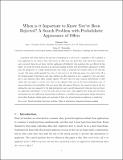When is it important to know you've been rejected? A search problem with probabilistic appearance of offers
Author(s)
Das, Sanmay; Tsitsiklis, John N.
DownloadP-06-sd-search-acc.pdf (247.5Kb)
OPEN_ACCESS_POLICY
Open Access Policy
Creative Commons Attribution-Noncommercial-Share Alike
Terms of use
Metadata
Show full item recordAbstract
A problem that often arises in the process of searching for a job or for a candidate to fill a position is that applicants do not know if they will receive an offer from any given firm with which they interview, and, conversely, firms do not know whether applicants will definitely take positions they are offered. In this paper, we model the search process as an optimal stopping problem with probabilistic appearance of offers from the perspective of a single decision-maker who wants to maximize the realized value of the offer she accepts. Our main results quantify the value of information in the following sense: how much better off is the decision-maker if she knows each time whether an offer appeared or not, compared to the case where she is only informed when offers actually appear? We show that for some common distributions of offer values, she can expect to receive very close to her optimal value even in the lower information case, as long as she knows the probability that any given offer will appear. However, her expected value in the low information case (as compared to the high information case) can fall dramatically when she does not know the appearance probability ex ante but must infer it from data. This suggests that hiring and job-search mechanisms may not suffer from serious losses in efficiency or stability from participants hiding information about their decisions, unless agents are uncertain of their own attractiveness as employees or employers.
Date issued
2010-02Department
Massachusetts Institute of Technology. Department of Electrical Engineering and Computer Science; Massachusetts Institute of Technology. Laboratory for Information and Decision SystemsJournal
Journal of Economic Behavior and Organization
Publisher
Elsevier
Citation
Das, Sanmay, and John N. Tsitsiklis. “When is it important to know you’ve been rejected? A search problem with probabilistic appearance of offers.” Journal of Economic Behavior & Organization 74.1-2 (2010): 104-122.
Version: Author's final manuscript
ISSN
0167-2681
0167-2681